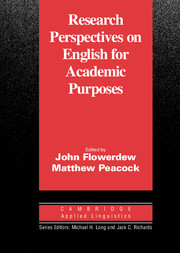Book contents
- Frontmatter
- Contents
- List of contributors
- Series editors' preface
- Preface
- I ISSUES IN ENGLISH FOR ACADEMIC PURPOSES
- Introduction to Part I
- 1 Issues in EAP: A preliminary perspective
- 2 Language use, language planning and EAP
- 3 EAP-related linguistic research: An intellectual history
- 4 Linguistic research and EAP pedagogy
- 5 International scientific English: The language of research scientists around the world
- 6 Discipline specificity and EAP
- 7 World Englishes: Issues in and from academic writing assessment
- 8 Addressing issues of power and difference in ESL academic writing
- 9 ‘I'll go with the group’: Rethinking ‘discourse community’ in EAP
- 10 EAP assessment: Issues, models, and outcomes
- II THE ENGLISH FOR ACADEMIC PURPOSES CURRICULUM
- References
- Index
3 - EAP-related linguistic research: An intellectual history
Published online by Cambridge University Press: 05 October 2012
- Frontmatter
- Contents
- List of contributors
- Series editors' preface
- Preface
- I ISSUES IN ENGLISH FOR ACADEMIC PURPOSES
- Introduction to Part I
- 1 Issues in EAP: A preliminary perspective
- 2 Language use, language planning and EAP
- 3 EAP-related linguistic research: An intellectual history
- 4 Linguistic research and EAP pedagogy
- 5 International scientific English: The language of research scientists around the world
- 6 Discipline specificity and EAP
- 7 World Englishes: Issues in and from academic writing assessment
- 8 Addressing issues of power and difference in ESL academic writing
- 9 ‘I'll go with the group’: Rethinking ‘discourse community’ in EAP
- 10 EAP assessment: Issues, models, and outcomes
- II THE ENGLISH FOR ACADEMIC PURPOSES CURRICULUM
- References
- Index
Summary
Foundations
Investigations into EAP target discourses (content textbooks, research papers, lectures and the like in relevant areas) have now been going on for almost fifty years. While the definitive history of this important aspect of the EAP movement probably does not need to be written, some insight into how we have got to where we are today is useful, especially for those who have only recently moved into the field or who are on the verge of doing so. Indeed, the umbrella field of ESL/ ELT is always in danger of losing its history, and thus ‘reinventing the wheel’ or ‘repeating the mistakes of the past’. There has not been a book-length attempt at a history of ELT since Howatt's 1984 volume, and Howatt in today's terms seems overly focused on European developments to the neglect of other parts of the world. One partial exception is Spolsky's Measured Words (1995), which tells the inside story of ESL testing over the last decades. Two others are Phillipson's Linguistic Imperialism (1992) and Pennycook's The Cultural Politics of English as an International Language (1994a), which provide revisionist accounts of mostly British contributions to ELT. Alas, there seems little room on all those MA courses in Applied Language Studies (or their terminological variants) for a component offering a historical overview of developments over the last forty years of general ESL/ELT, let alone for one targeted on EAP (regarded as a subset of ESP in this paper).
- Type
- Chapter
- Information
- Research Perspectives on English for Academic Purposes , pp. 42 - 54Publisher: Cambridge University PressPrint publication year: 2001
- 16
- Cited by



